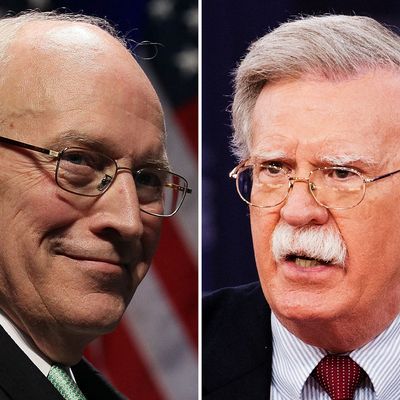
There’s been an awful lot of debate over the particular strain of Republican foreign-policy thinking represented by new National Security Adviser John Bolton. Everyone agrees with adjectives like “bellicose” and “combative” to describe his style, but it’s not 100 percent clear which broader worldview provides the framework for this fierce mustachioed man’s bellicosity and combativeness. He is most often described as a “neoconservative” due to his unrepented support of the Iraq War and his service to the George W. Bush administration. But others have linked him to the “paleoconservative” tradition of unilateralist and nationalist skepticism of diplomacy, alliances, and international institutions, which is also frequently used as the “school” to which the president himself belongs.
But more and more, the old tripartite typology of GOP foreign policy as being divided into neocons, paleocons, or “realists” seems inadequate to describe people like Bolton (and for that matter, Trump). So if there’s a fourth “tradition, what is it and who belongs?
The New Republic’s Jeet Heer argues that Bolton is a “radical nationalist:”
Radical nationalists, such as Barry Goldwater and, in more recent years, Jesse Helms and Dick Cheney, share the neoconservative disdain for international institutions but have no real interest in democracy promotion. Rather, they advocate a raw assertion of American power for the sake of maintaining global hegemony.
Neoconservatives are often scapegoated for the Iraq war, but in fact it was the result of an alliance between neocons and radical nationalists, who sidelined the prudential realists who were wary of the war. Bolton is a radical nationalist.
And that, says Heer, makes him a good fit for his new boss, whose “instincts” are “hyper-nationalist,” even if “thinking” is the wrong noun to use in conjunction with his outlook.
But more alarmingly, another writer suggests that what characterizes both Bolton and Dick Cheney is a common disdain for thinking much before acting. According to Ross Douthat, who knows a thing or two about Republicans, we’re talking about pure “hawks:”
[T]he hawkish tradition, from Douglas MacArthur down to Dick Cheney (a realist reborn as a hawk post-9/11) and now Bolton, is distinguished by simplicity: The default response to any challenge should be military escalation, the imposition of America’s will by force — and if one dangerous regime is succeeded by another, you just go in and kill the next round of bad guys, too.
Yikes.
Douthat thinks Bolton’s ascent reflects a broader trend in the Trump administration, which has taken a while to reach this natural juncture, but has reached it nonetheless, at a moment when all sorts of dangerous decisions may soon be made:
In Trump year one, the paleocon-ish elements in his circle — Steve Bannon, most prominently — were sidelined by H. R. McMaster and James Mattis, and Trump ended up with a realist-leaning foreign policy run by businessmen and generals, with Nikki Haley occasionally sounding neoconservative notes at the U.N.
But Trump didn’t get along with McMaster and Rex Tillerson — and he clearly thinks he might like hawks better. So now we have an administration in which both paleoconservatism and neoconservatism are sidelined, and straight-up hawkishness is institutionally ascendant as it has rarely been in modern presidencies — save in the Peak Cheneyism following 9/11.
Anyone who was terrified by “Peak Cheneyism” should be seriously concerned about Bolton, particularly if Douthat’s right that this is not just one of many Trump personnel moves that are random and temporary in nature. Indeed, the scariest possibility is that a new label will soon be applied to the foreign-policy school in which Bolton (and Cheney and Helms and Goldwater) can be classified: Trumpism.






























